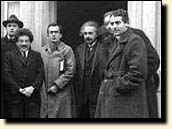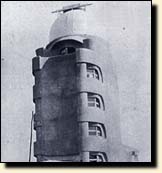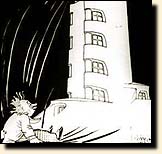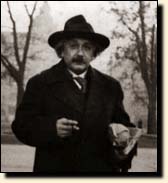
Einstein visiting the Physics
Institute in Leiden, The Netherlands. |
Einstein traveled widely in the 1920s, both as a spokesman
for liberal causes and as an esteemed member of the physics
community. He visited England, France, Austria, Czechoslovakia,
and South America and traveled east as far as Japan, returning
by way of Palestine and Spain. In 1922 he went to Sweden to
accept a Nobel Prize in physics. Between 1930 and 1933 he
spent each winter in Pasadena at the California Institute
of Technology, each spring in Berlin, and each summer near
Berlin in a home at Caputh. |

"How I wish that somewhere there existed an island for those
who are wise and of goodwill! In such a place even I would be
an ardent patriot."


The "Einstein Tower" in Germany. |
Anti-Semitism was openly pursued by the powerful political
right and the emerging Nazi party since 1919. Nazi physicists
and their followers violently denounced Einstein's theory
of relativity as "Jewish-Communist physics." At times his
friends feared for his safety. Such anti-Semitism was one
reason why Einstein, although he believed in world government
rather than nationalism, gave public support to Zionism. "In
so far as a particular community is attacked as such," he
said, "it is bound to defend itself as such, so that its individual
members may be able to maintain their material and spiritual
interests... In present circumstances the rebuilding of Palestine
is the only object that has a sufficiently strong appeal to
stimulate the Jews to effective corporate action." But he
objected to a law that required him to join the official Jewish
religious community in Berlin. He said, "Much as I feel myself
a Jew, I feel far removed from traditional religious forms."
|

An anti-Semitic cartoon from
1932. |

|
As the Nazi movement grew stronger, Einstein helped to
organize a non-partisan group, within the Jewish community,
that advocated a united stand against fascism. Hitler's climb
to power, bringing official support of vicious anti-Semitism,
was making the position of Jews and other opponents of Nazism
impossible. After Einstein left Germany in 1932 he never returned.
In March 1933 he once again renounced German citizenship.
His remaining property in Germany was confiscated, and his
name appeared on the first Nazi list of people stripped of
their citizenship. |

Einstein just before he left his homeland |
 Click here for Einstein's voice -- on the Holocaust
Click here for Einstein's voice -- on the Holocaust
| Many universities abroad were eager to invite the renowned
scientist, but he had already accepted an offer to join the
Institute for Advanced Study in Princeton, New Jersey. He arrived
in the United States in October 1933, and in 1940 became an
American citizen. In 1936 his wife Elsa died. One of her daughters
and Einstein's long-time secretary lived on with Einstein in
Princeton and helped with housekeeping. |
|
|

